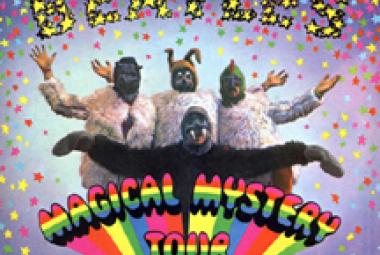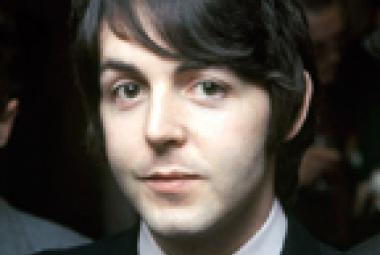Mick Jagger (born 26 July 1943) is an English singer, songwriter and actor, best known as the lead vocalist and a co-founder of The Rolling Stones. Jagger’s career has spanned over 50 years, and he has been described as “one of the most popular and influential frontmen in the history of rock & roll”. His distinctive voice and performance, along with Keith Richards’ guitar style, have been the trademark of the Rolling Stones throughout the career of the band. Jagger gained press notoriety for his admitted drug use and romantic involvements, and was often portrayed as a countercultural figure. In 1989 Jagger was inducted into the Rock and Roll Hall of Fame, and in 2004 into the UK Music Hall of Fame with the Rolling Stones. In 2003 he was knighted for his services to popular music. (More from Wikipedia)
But there is no shortage of interpretations of “American Pie” from all quarters (I took a stab at it myself ages ago): Bob Dylan is said to be the “jester”; the Beatles are evidently referenced in the line “sergeants played a marching tune”; and the Rolling Stones (Mick Jagger in particular) seem to have a more central role in the tale – the fifth verse includes the lyric “Jack be nimble, Jack be quick / Jack Flash sat on a candlestick” (an obvious reference to the Rolling Stones hit “Jumpin’ Jack Flash”), several mentions of Satan (“Sympathy for the Devil” is one of several times that the Stones toyed with Satanic imagery), and apparent veiled references to the horrific Altamont Speedway Free Concert that occurred on the heels of Woodstock on December 6, 1969, where the Rolling Stones were the featured act, and the Hells Angels motorcycle club provided security.
As depicted in Gimme Shelter (I saw the film when it came to theatres in 1970, but I never want to see it again), one audience member, Meredith Hunter was stabbed to death by several bikers after he pulled a gun – and yes, someone caught the incident on film. Lead male singer Marty Balin of Jefferson Airplane was knocked out cold by a Hells Angel, and Mick Jagger was punched in the face by an unruly fan shortly after his arrival by helicopter. It was a perfect storm where simply everything went wrong – the rain and the other privations at Woodstock were nothing compared to what occurred at Altamont.
* * *
“La Bamba” has been covered numerous times over the years; another Hispanic star, Trini Lopez had a 1966 hit with a more mellow version of the song, while Freddy Fender got on the charts with a Tex-Mex treatment. Folk artists like the Kingston Trio, Joan Baez and Harry Belafonte (among others) have also recorded the song. In one of their early sessions together, Mick Jagger and Keith Richards played “La Bamba” in 1961; ironically, they were both 17 years old, the same age as Ritchie Valens when he perished on the airplane crash. The tape of this rare recording brought $81,000.
(June 2013/1)
* * *
Much of the overheated rhetoric about J. Reuben Silverbird is about his name changes; even the minor switch from Ruben to Reuben is mentioned. Using stage names is hardly limited to rock musicians – the very term itself shows that its origin is in the theatre. You needn’t go any further than the drummer for the Beatles to find one: Ringo Starr (born Richard Starkey). Guitarist and songwriter Keith Richards of the Rolling Stones used the name Keith Richard for many years. The John Birch Society called Stones frontman Mick Jagger “Mick Jaeggert” back in the 1970’s; a Google search brought up only two websites using this name – one French and one Hungarian – so this is probably not for real.
(August 2013)
In 1962, Dick Taylor was in a band called Little Boy Blue and the Blue Boys with Mick Jagger and Keith Richards. Brian Jones was recruiting members for his own band, and these three joined up along with Ian Stewart. Jones came up with the name Rollin’ Stones for the band; they went through several drummers before Charlie Watts joined the line-up.
The Rolling Stones were the “bad boys” of the British Invasion. They played around with Satanic themes and imagery, most famously with their hit “Sympathy for the Devil”, and also their under-rated psychedelic album that had the unfortunate title of Their Satanic Majesties’ Request. (From Wikipedia: “The album’s title is a play on the ‘Her Britannic Majesty requests and requires ...’ text that appears inside a British passport.”)
But even the Stones came up with a religious themed song a while back, or at least Mick Jagger did: “God Gave Me Everything” was co-written by Mick and Christian rocker Lenny Kravitz (who also performed on the recording) and was included on his 2001 album, Very Best of Mick Jagger. I remember seeing the video many years ago back when you’d see those on MTV from time to time.
(November 2014)
* * *
Kim Fowley always wanted to be where the action was, so he relocated for a period of time to London by late 1963. One of the first fruits of his sojourn there might have been a rollicking cover version by Bo and Peep of the Sonny James/Tab Hunter romantic ballad “Young Love” that was released on Decca Records in 1964 not long after Fowley arrived in the UK. The long-time Rolling Stones producer Andrew Loog Oldham was on hand, and it is clear from the record that the studio was jammed with people. Rumored to be among those participating in the recording are Mick Jagger (and perhaps other Stones), Gene Pitney and Kim Fowley. The song is included on the Pebbles, Volume 6 LP and the English Freakbeat, Volume 6 CD.
(January 2015/1)
* * *
The first performance by what was then called the Rollin’ Stones – named after the landmark blues song “Rollin’ Stone” by Muddy Waters – took place on July 12, 1962 at the Marquee Club in London. The line-up at that time was Mick Jagger (lead vocals, harmonica), Keith Richards (guitar), Brian Jones (guitar, harmonica), Ian Stewart (piano), Dick Taylor (bass), and Mick Avory (drums – Avory himself recalls that it was actually Tony Chapman). Mick Jagger and Keith Richards had known each other as children and were reacquainted by Dick Taylor, who was a mutual friend. Bill Wyman replaced Dick Taylor on bass in December 1962; Taylor then became one of the founding members of the Pretty Things, a band that is as long-lived and (in some circles) as beloved as the Stones, though with a significantly lower profile. When Charlie Watts joined the band on drums in January 1963, and with Ian Stewart removed from the official band membership (also in 1963), the classic line-up of the Rolling Stones was born.
* * *
The Beatles came to see the Rolling Stones at the Crawdaddy Club on April 14, 1963; afterwards, the two bands repaired to Mick Jagger’s flat in Chelsea. As the Stones’ fame spread, the Crawdaddy Club was forced to move to a larger space.
* * *
In June 1963, the Rolling Stones released their debut single, a cover of a Chuck Berry song called “Come On”, which reached #21 on the UK charts. The flip side was Willie Dixon’s “I Want to be Loved”. Wikipedia reports about “Come On”: “During the June 6, 2013 concert in Toronto, Canada, as part of the 50 & Counting Tour, Mick Jagger sang a few bars (with Charlie Watts drumming the beat) after mentioning the single being released exactly 50 years ago that day. It was the first time the song was heard in any capacity during a Rolling Stones concert since 1965.”
(January 2015/2)
* * *















